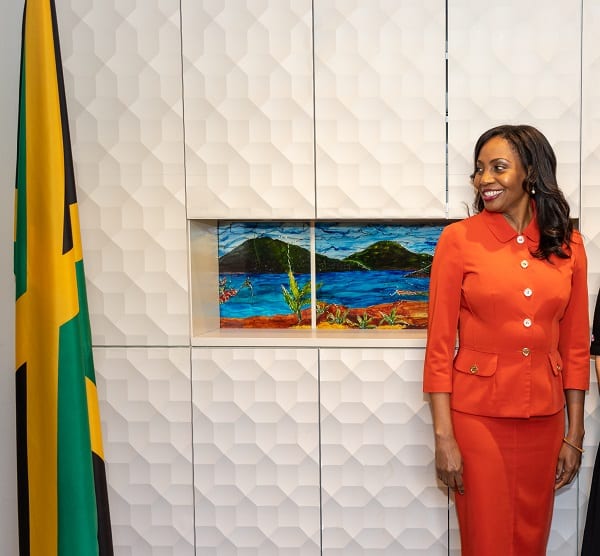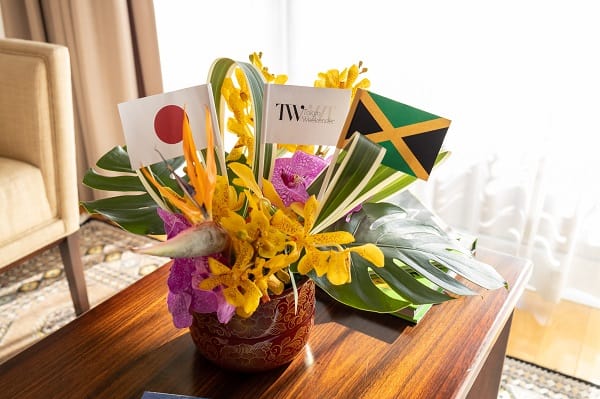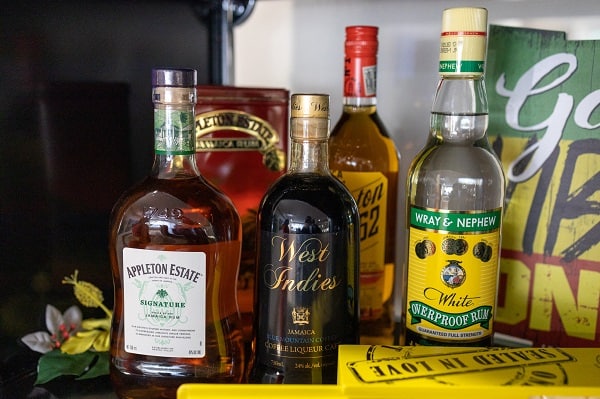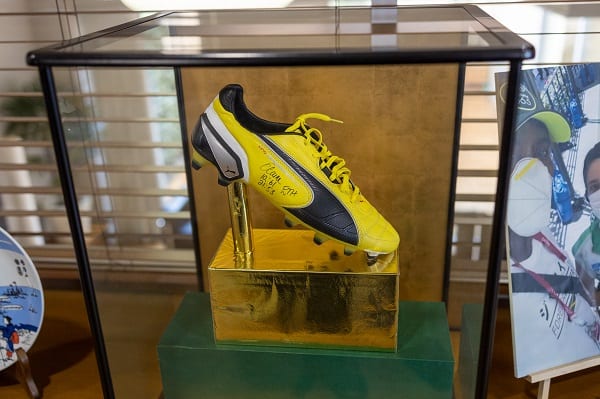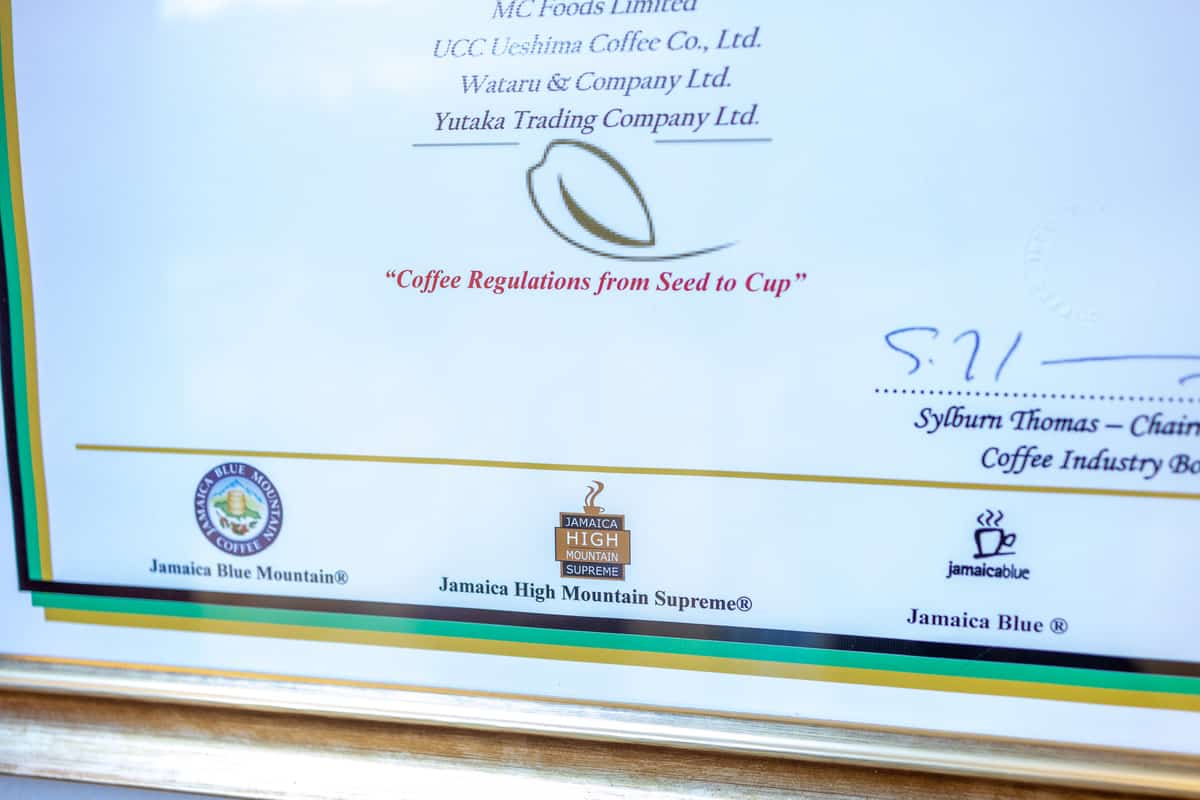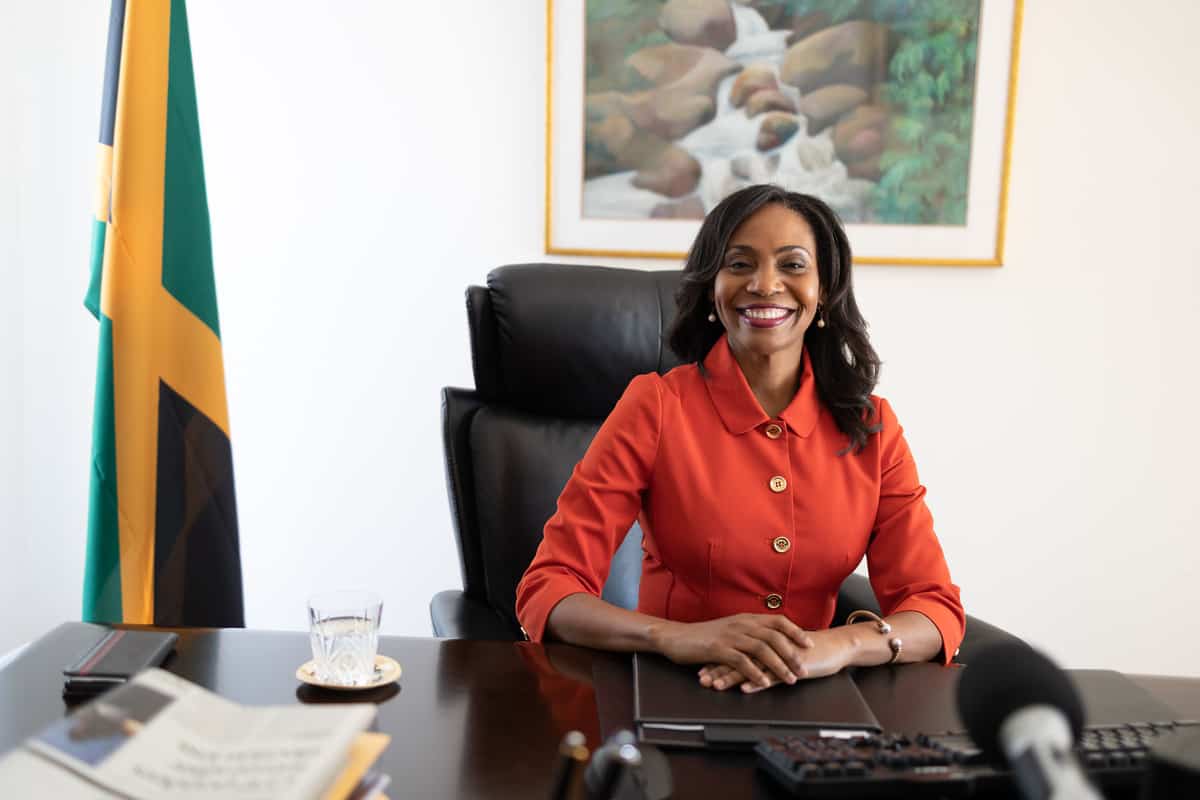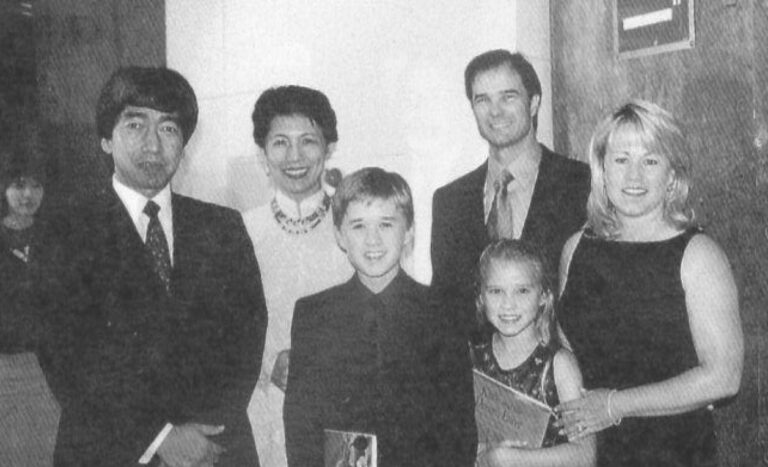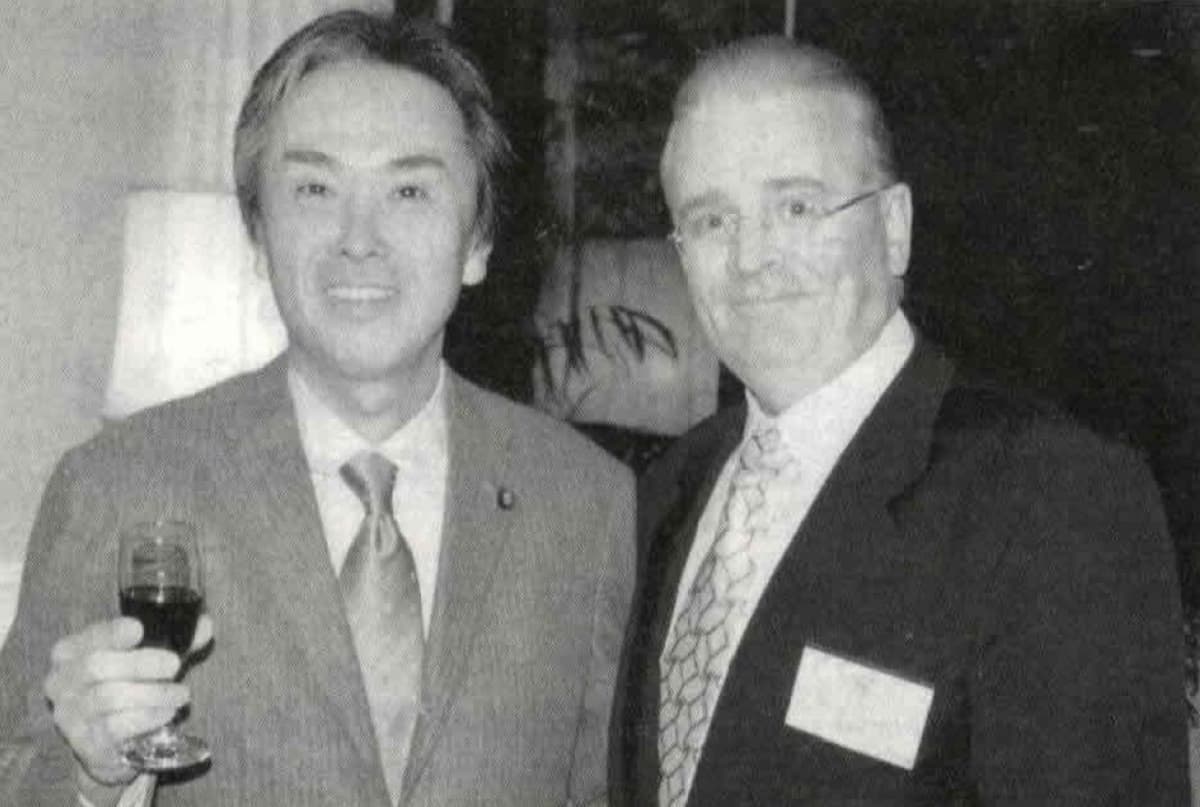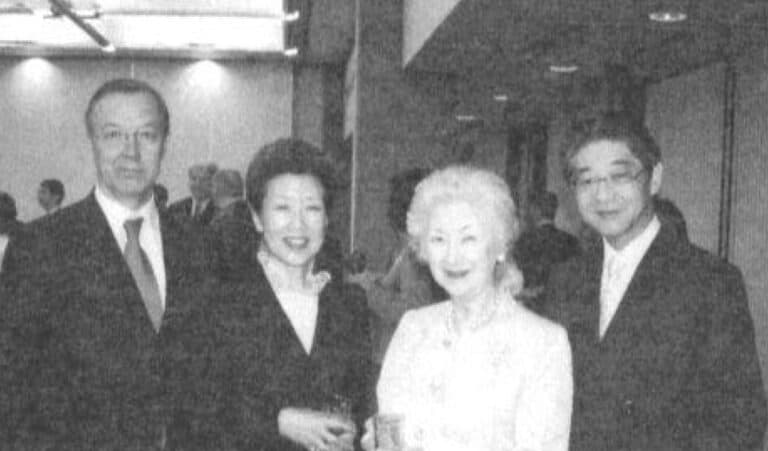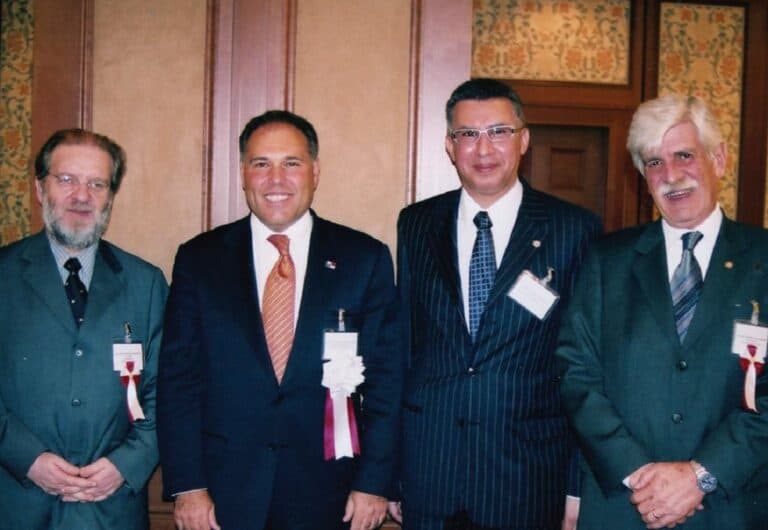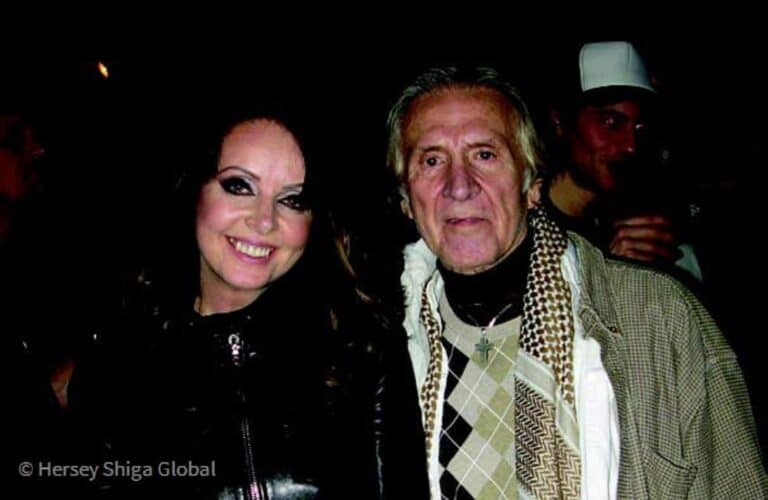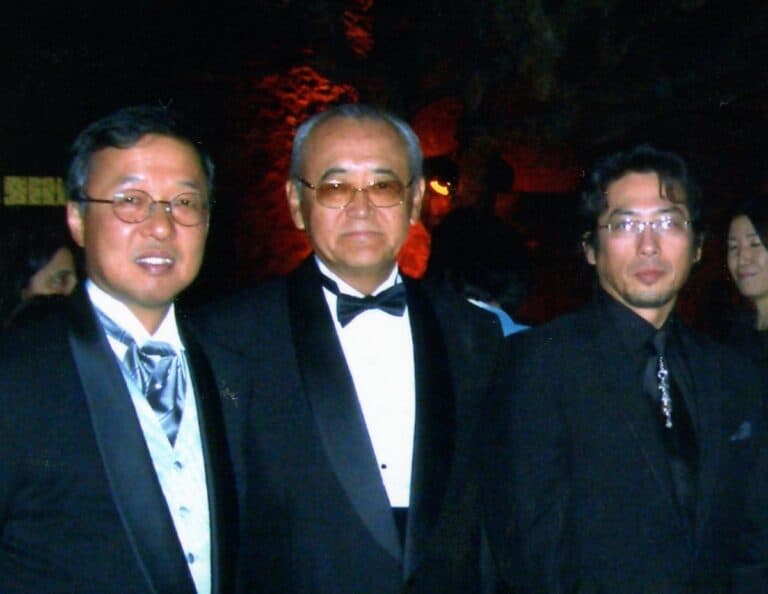Interview with Jamaican Ambassador to Japan, H.E. Ms. Shorna-Kay M. RICHARDS
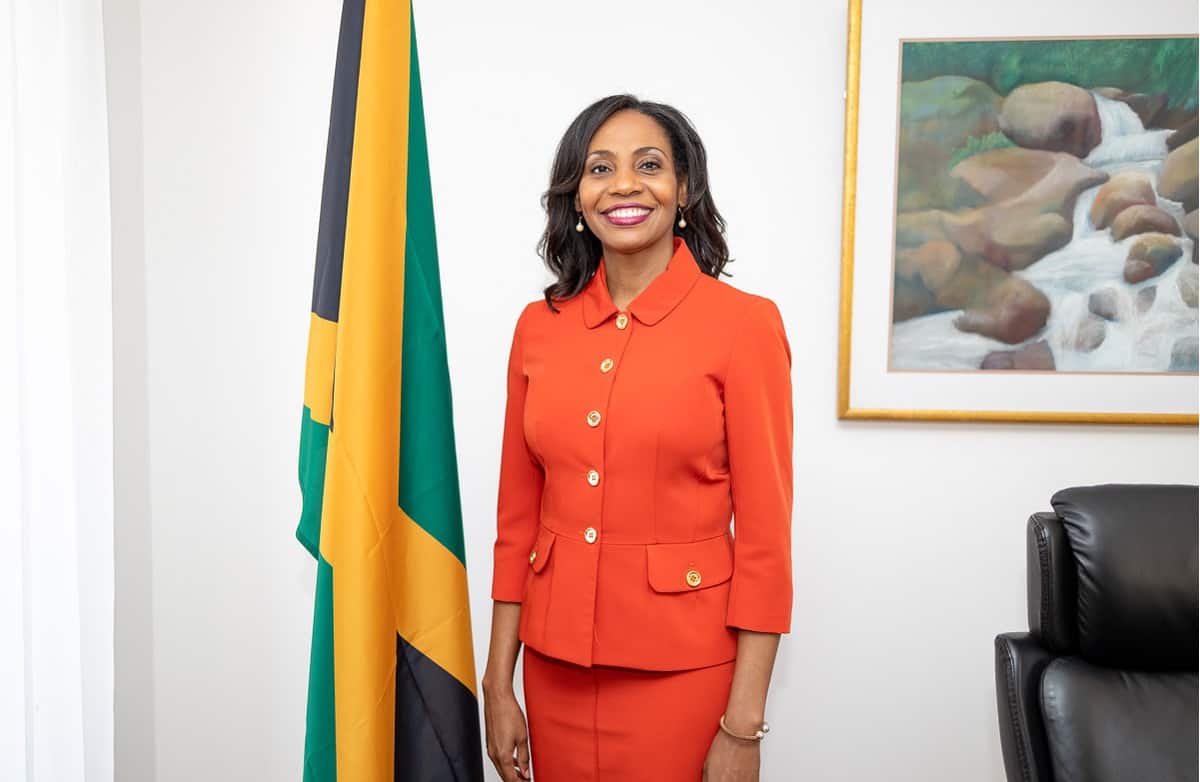
We sat down with the Jamaican Ambassador to Japan, Her Excellency Shorna-Kay M. Richards, to talk about her mission in Japan and her career as a diplomat for her country that brought her on a path to Japan. She also provides advice for women in diplomacy by reflecting on her own career.
Her energy, friendliness, genuine pride for her own culture, and deep respect and admiration for Japan doubles as gratitude for her appointment as the Jamaican Ambassador to Japan and a lifelong friendship between these two countries.
PART I: LATIN AMERICAN AND CARIBBEAN BAZAAR
What were your impressions from the most recent Latin American and Caribbean Bazaar held at the Mexican Embassy?
It was such a pleasure for me to participate in this bazaar for the very first time.
We highly support the objective of the Bazaar, which is to raise funding for welfare organizations in our respective countries.
For many years, we have been able to raise some funding to support children’s homes and programs in Jamaica through this bazaar. However, last year, we couldn’t do so due to the pandemic.
I was happy therefore that this year we were able to find a way to hold this charity event, and the funding that we raised was able to make that contribution. I am looking forward to next year’s event, having had the experience.
Your booth was very popular among visitors who came to the bazaar – you were also wearing traditional wear.
The Embassy quickly put that together in a few weeks. Decorating the Jamaican booth in one morning was challenging, but I loved the idea and the opportunity to participate.
What I wanted to do was to showcase the vibrancy of Jamaica. The colors of our flag all stand for something. The gold represents sunshine and vibrancy. And of course, the green represents the land with its natural resources.
The black stands for the people who are strong and creative. We are a people who came out of slavery, confronting many difficulties, and challenges but we seek to overcome them and find a way to move forward.
So, whenever we represent Jamaica, we try to embody this flag, the vibrancy and the spirit of our people.
And speaking about spirit – you know, Bob Marley and the Wailers’ famous song ‘One Love’ was named the song of the millennium by the British Broadcasting Corporation (the BBC). One love for us is the solidarity, the oneness, the coming together. So, through our booth, we sought to attract people to come together, relax and feel good. ‘Everything is going to be alright.’ We hope that the booth had that energy, color, and life.
At your booth, you also had a sports section celebrating this year’s Olympic Games.
Yes, we were happy to have a sports section celebrating this year’s Olympic Games. At the Tokyo Olympics, we were able to again demonstrate to the Japanese people how grateful we are for their admiration of Jamaican athletes who were able to perform very well here. In particular, our women did very well in the 2020 Olympic Games.
At the Emperor’s birthday reception hosted by the Embassy of Japan in Kingston this past February, our Foreign Minister, Senator the Honourable Kamina Johnson Smith` said that Japan would deliver safe, secure, and enjoyable games. I shared our Minister’s confidence in Japan’s ability and was pleased that this outcome was achieved. I cannot think of any other country on this planet that could have successfully hold the 2020 Olympic Games during a global pandemic.
It’s fair to say, only Japan could do so and we are very proud of what the Japanese have done during a time of great crisis.
The Games brought global solidarity because everybody watching on TV around the world felt closer together during the pandemic. It took our mind away from the pandemic, even for a brief moment, at a time when need it most.
Solidarity is very important to humanity and to the human psyche as a global community.
Also, the Jamaican Olympic team was very happy and they learned so much about Japan. The only sad thing was that they couldn’t get to see more of the city among other things. But they were all impressed with the level of preparation and the safety and comfort provided.
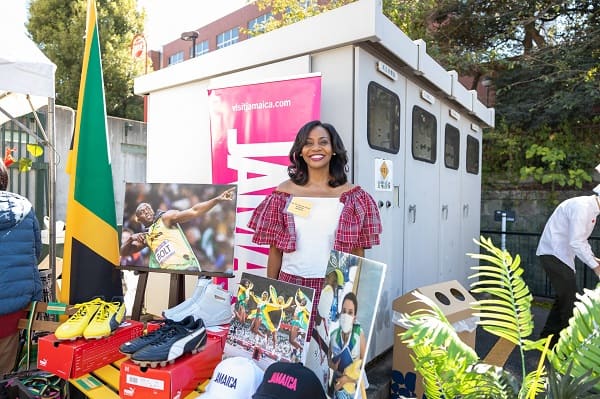
What was the most popular item you sold at the charity bazaar?
The two most popular items we sold at this event were the Jamaica Blue Mountain Coffee and Jerk seasoning.
We are very proud of our Jamaican Blue Mountain Coffee. In a way, Jamaican Blue Mountain Coffee was our first “Ambassador” to Japan as it was here from 1953. So, I say [as Ambassador to Japan] that I am following in the footsteps of our coffee.
Coffee opened the way, and it is not just a simple relationship, it’s a development relationship. Over the years, the Japanese importers of Jamaican coffee have not only purchased the coffee but have also invested in our communities of the farmers, including in the maintenance of schools and roads.
This development approach by the Japanese coffee importers is reflective of Japan’s approach to human security in its official development assistance and the private companies in Japan practice the same thing, more or less. It’s about development. It’s not just trading for the sake of trade, but also supporting the communities.
Japan used to import about 90% of what we produce, and now it’s about 70%. So, Japan has been the most significant partner in our coffee industry. The Association of Japanese Exporters of Jamaica Coffee (AJIJC) even started an initiative nearly four years ago, to make January 9th in Japan, Jamaica Blue Mountain Coffee Day.
Jamaica Blue Mountain Coffee is one of the finest coffees in the world, with well-balanced smoothness and an amazing aroma. The coffee is grown in a limited area in our Blue Mountain range, under the perfect temperature and the berries are handpicked.
Coffee is very important in our history and culture and certainly here in Japan, where it is at the core of the friendship between our two countries. It, therefore, had to be on display and ready for sale at the bazaar as the best seller.
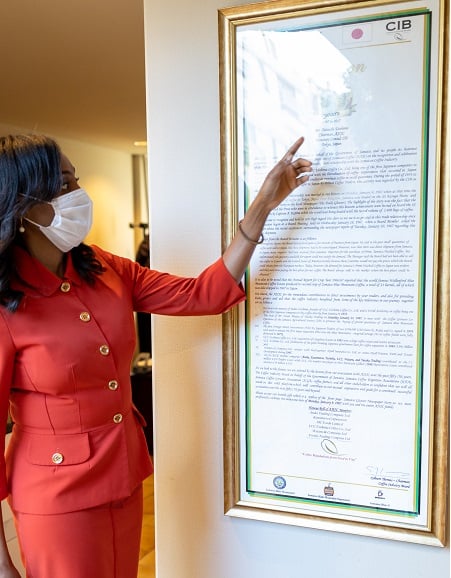
Did you have dedicated space at the food court?
Unfortunately, not. We didn’t have any food this year because it was very short notice and bearing in mind the pandemic. But next year, yes, you’re going to eat Jamaican delights.
However, we served Jamaican rum punch that I made which was quickly sold out. Jamaica is famous for its rum. We are the second oldest producer of rum in the world. The first was Barbados in 1703, then Jamaica in 1749 followed by Martinique.
Because Jamaica was a sugar colony, we were producing sugar by the British colonizers, so rum started from then.
The recipe that I made is with Jamaican white overproof rum (J Wray and Nephew). This white rum has 63% alcohol. As you can imagine, there were some very happy people at the bazaar.
My recipe for the punch is the traditional recipe and very simple. It calls for four parts of weak, three parts of strong, two parts of sweet, and one part of sour. It’s a combination of fruit juice, white rum, special syrup, and lime juice. Add some all-spice berries; lots of Jamaican love and energy and you get quite an elixir for life.
That’s what we usually serve even when we are having lobbying events. And it works wonders.
You have a basket of cotton in front of you. Could you tell us more about this?
I just wanted to showcase that Jamaica does not only export coffee to Japan but also the rarest and finest cotton in the world — the West Indian Sea Island cotton. I visited Shinshu University in Nagano recently where there doing research on the West Indian Sea Island cotton to address traceability, productivity, and sustainability. And I went to Kondo Cotton Spinning Mills where they spin this cotton into high-quality yarn.
This cotton was loved by the British aristocracy and the hidden gem of British stakeholders over 200 years. Its export to Japan was permitted in 1975. Over the years it has become popular in Japan. And of course, James Bond had his handkerchief and shirts made from this cotton. It’s just the best cotton in the world and it feels amazing.
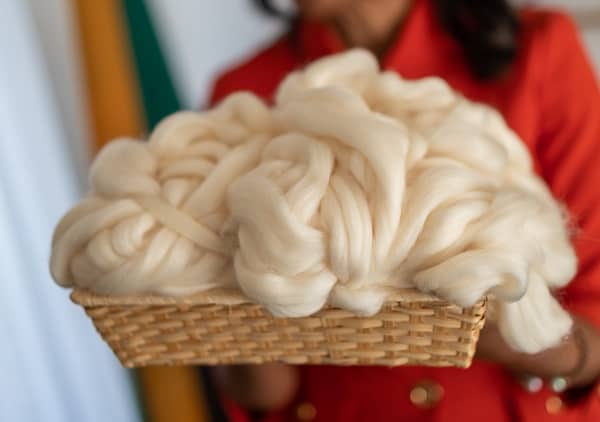
PART II: THE RISING SUN ON THE HORIZON
There is a strong spirit in Jamaica that stems from its very diverse history and culture. It seems that your country possesses this independent mindset and love of freedom that also provides opportunities for both genders. Please tell us about your career path and your work at the Jamaican Foreign Service.
I never imagined I would join the Foreign Service. In my pre-university days, I loved history, literature, and Spanish.
In fact, we had this quiz on television, the school challenge quiz, and I was on the quiz team with three other women. I was the one answering Spanish language-related questions. So, everybody thought that I really should do something with Spanish.
I thought so myself, and when I went to university, I chose Spanish as my major. But the head of my Spanish department said I should include another course of study. So, I added international relations and French to my Spanish studies.
As for my career, in my final year of university, I had hoped to teach feminist Spanish literature.
I had been studying several Spanish writers who explored the issue of treatment of women in society whether it was in Spain or South America.
I was very fascinated by the themes of women empowerment and women arising from difficult circumstances as well as the roles that were predetermined for women in society.
The writings explored some of the questions that women had, the difficulties, and how to overcome them.
Anyway, in my final year, in early spring 1994, the university had a career fair which I attended. The Foreign Ministry had a booth there which I visited and listened to the presentation. I decided on the spot that I was going to go and sign up for what they call a pre-selection interview at the career placement office of the university because I was intrigued.
Indeed, I took it so seriously. I remember getting a special suit made for this interview, although it was just one person coming to the university to do the interview. It was the head of the personnel department at the Foreign Ministry, and she selected me to participate in what is called a panel interview after I finished university study in June.
In August, the Foreign Ministry invited me for a panel interview in which I was successful and I then joined the Foreign Service with three other women in September 1994.
Today, I’m the only one who remained in my group. It’s the only job I have ever had. I am so proud and passionate to be a member of the Jamaican Foreign Service.
Tell us about your training as a diplomat
In Jamaica, we do not have a diplomatic school. We are a small country, with a small foreign service and training is mainly on the job for four years before you have an overseas assignment. We also get scholarship and training offers from our bilateral partners, namely countries that have large Foreign Services.
Germany, for example, had a six months training program for junior diplomats from developing countries. And, I was a beneficiary of a German scholarship in 1997. I spent six months in Berlin where I received my diplomatic training, so I always say I am the product of German diplomacy. For the ten-year anniversary of this program, I was invited to testify about the impact on my career. I’m very proud of that experience.
What led your career path to Japan?
Interestingly my career path to Japan came full circle. In 2005, I was selected as a United Nations Disarmament fellow. With 30 other fellows, I participated in a 2-month disarmament program which included study visits in cities as Geneva, Vienna, the Hague, and Berlin. Within this program, the Japanese government offered a one-week study in Nagasaki and Hiroshima so that we can be exposed to the only country that has ever experienced the terror of nuclear bombs and learn about the realities of the terrible devastation of the bombing.
We came to Japan for that week at the end of September, and I remember the last few days we were in Hiroshima. After that we did the tour of the peace memorial museum, the peace memorial park and other sites, the Coordinator of the program asked me to deliver remarks, together with a representative from Pakistan, on behalf of all the fellows at the Hiroshima Riga Hotel at the welcome reception.
I still have the remarks I made that night right here with me in Japan today. In the remarks, I said the impact of the Hibakusha’s testimony was so powerful that I shared their view – ‘never again.’ I added that if I ever serve at the United Nations, I would take their vision with me to work on the abolition of nuclear weapons so we can have a world free of nuclear weapons.
It was eight years later when I was appointed deputy ambassador to the U.N. in New York, and I remembered the promise that I made in Japan in 2005. I, therefore, chose to cover the work of the First Committee, Disarmament International Security Committee instead of the Fifth Committee, the Budget Committee which deputy ambassadors in the Jamaican Mission to UN normally cover.
During those four years, work started on the treaty to ban nuclear weapons. I got very involved and very engaged. I am one of the few female diplomats from the Global South who have been speaking on the issue of nuclear. I was very active in the process at the UN that led to the negotiation Treaty on the Prohibition of nuclear weapons.
In 2020 I came back to Japan, this time as the Jamaican Ambassador to Japan. And, when I went in August this year to Hiroshima to attend the annual peace memorial service, it was very emotional for me because never did I imagine that I would become ambassador to this country after the pledge I made in Hiroshima 16 years ago to the Hibakusha. This great country has impacted me greatly and contributed so much to my career and the work peace, disarmament, and security.
We cannot have sustainable development if we don’t have peace. If we are in conflict or at war, the resources that we spend on weaponry, be it nuclear or conventional, can be best spent on funding development and peaceful initiatives.
And I believe that women play an important role in shaping the debate, in laying more emphasis on collaboration, peace, and security rather than war and conflict.
PART III: WOMEN IN DIPLOMACY AND INSPIRATION FOR FUTURE GENERATIONS
Obviously, you come from a country that relies on its female members for their diplomatic work, and that provides a favorable environment for female members to develop their careers in diplomacy. How about Japanese women in diplomacy?
Well, Japanese women in diplomacy, I’d love to see more.
Japanese women are highly educated and I’d love to see them playing a greater role, an equal role in representing Japan.
You know, I would say the Japanese women, like Jamaican women and women elsewhere, hold up more than half the sky. And that should be reflected not just in the idea, but in our being allowed to make contributions.
No limitations. It’s our choice. You can choose, you have a voice, you can exercise that.
But I think being exposed to other cultures and societies and seeing how women across the world operate will help Japanese women to ask the questions that will enable them to move forward. Take your place in making that equal participation because you contribute more than men.
It starts with us individually. Of course, we have society around us, but understanding the society and asking ourselves: What is my dream? What do I want to do? — that will help us to realize that we each have a voice, we have agency. So, I think women should help each other to succeed.
As I say to other Jamaican women, young and old, or to Japanese women or other women from around the world, let’s work together to create a critical mass so that we can make our contribution together.
Please reflect on the current environment for women in Jamaica, and what would like to work on to contribute to continuous improvement for women worldwide?
Of course, women in Jamaica face many challenges. We, like many countries, have to deal with domestic violence. It’s a global challenge and the pandemic has only exacerbated domestic violence.
Let me share that as the Government of Jamaica works to address the scourge of domestic violence, our Ministry with responsibility for Gender Affairs was able this year to refurbish and develop a women’s shelter thanks to Japanese funding support provided through the Japanese Embassy in Kingston. We thank the Japanese Government for this important support.
We also have to contend with the ‘pay gap’ issue that remains a challenge for women globally. We should have equal pay for equal work. That’s something that we continue to advocate for.
On the other hand, we are ranked number one in the world for having the most women managers globally. However, we can do much better in terms of political representation.
Thankfully, we have had some success last year where we started to see an increase of women in political participation.
We must continue to encourage women’s empowerment. What is your dream? If your dream is to be a minister, it’s possible. Go for your dream. It’s difficult, but it’s possible.
Countries around the world have varying perspectives on gender and in many cases, it is difficult to move beyond very defined gender roles. However, as time evolves changes will happen including in Japan. Indeed, culture shifts and adapts with more exposure to other cultures, that’s internationalization.
I have been open to other societies and cultures and experiences. For me, that makes me a richer person. I would encourage young Japanese women to also be open to other societies, cultures, and languages because that will broaden their worldview and horizon and allow them to feel more comfortable asking important questions.
I have the opportunity to be mentoring three women under the Japan Women’s Innovative Network ‘J Win’ and I will have my first welcome lunch with them soon.
I’m excited not only about sharing my experience and my challenges but also about learning about theirs because I can learn so much more from the female executives here and what they have gone through.
We’ve seen that knowledge is power. That’s why I believe in lifelong learning and learning from so many different perspectives. I’m excited about this mentoring network. However, I also want to be mentored by younger women because I am a product of the 20th century, and I have my own challenges in the 21st century.
I want to have young women also share their situation, their challenges, and then I can share mine. Together, we become richer, and the world is being enriched through our empowerment.
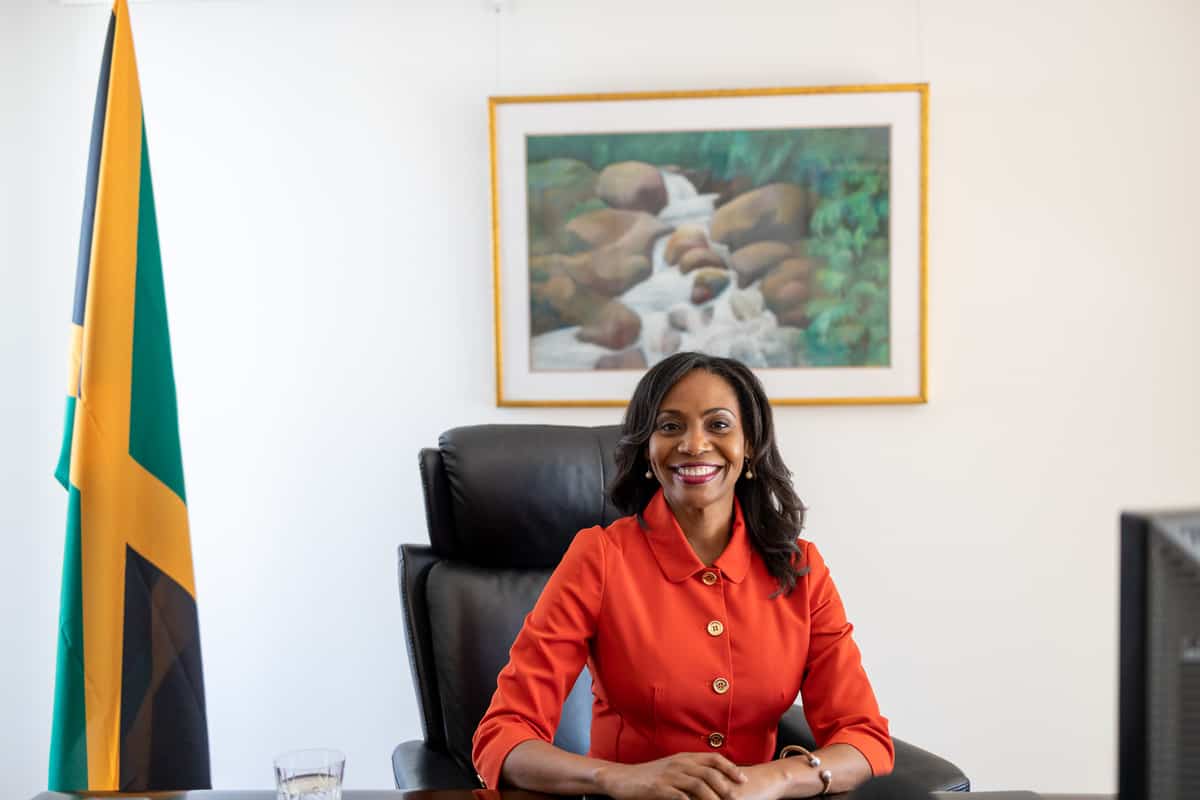
PART IV: UPCOMING EVENTS
2022 is a very important year for Japan-Jamaica relations. Tell us about some upcoming events.
Early next year, we will be hosting an event to celebrate Jamaican Blue Mountain Coffee Day and I hope to invite you to celebrate with us.
The 6th of August 2022 is Jamaica’s 60th anniversary of Independence. Also, the J-J partnership will be sixty years old in 2024. We’ll be celebrating the 60th anniversary of the establishment of diplomatic relations between Japan and Jamaica in 2024.
There’s a smaller festival done by Japanese organizers called the Jamaica Festival: reggae and cuisine, which might happen in June next year, so I can talk a little about that next year.
I just want to do my very best for what I consider to be one of our most important bilateral relationships — what we have with Japan. I really want to have this relationship grow to even higher heights.
We thank Jamaican Ambassador to Japan Richards for this interview and for her great contributions to Jamaican-Japan relations.
Read more:
International Women’s Day Celebration at the Jamaican Embassy in Japan

